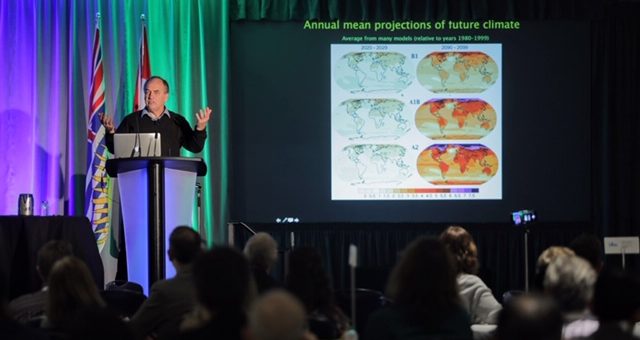Environment
When will government introduce species at risk legislation?
Today in the legislature I rose during Question Period to ask the Minister of Environment and Climate Change Strategy when he would be introducing Species at Risk legislation. As I note in my question (reproduced in video and text below), the introduction of such legislation is part of the minister’s mandate letter.
I also commented that when the Minister was in opposition he introduced his own Species at Risk legislation as a private member’s bill a day after I introduced my private member’s Species at Risk bill on February 27, 2017. I reintroduced my bill in the fall of 2017, once the BC Liberal government had been replaced by the BC NDP government. In all cases, the bills died on the order papers without being debated.
Video of Exchange
Question
A. Weaver: Earlier this year the Intergovernmental Science-Policy Platform on Biodiversity in the Ecosystem Services released the most comprehensive assessment to date on the state of biodiversity and ecosystems worldwide. It warned of unprecedented and accelerating extinction rates with millions of species at risk of disappearing forever, many within decades — more than ever before in human history.
The chair of the report said this: “The health of ecosystems on which we and all other species depend is deteriorating more rapidly than ever. We are eroding the very foundations of our economies, livelihoods, food security, health and quality of life worldwide.” British Columbia has more species at risk than any other province or territory in Canada. Despite this fact, and despite the warnings of the Intergovernmental Panel, we still have no dedicated law to protect endangered species.
My question is to the Minister of Environment and Climate Change Strategy. Why is B.C. still one of the last jurisdictions in Canada without a law to protect endangered species?
Answer
Hon. G. Heyman: Thank you to the Leader of the Third Party for the question. He is absolutely correct that B.C. is Canada’s most ecologically diverse province, and we also have by far the greatest number of species at risk of any province in Canada.
We know that we have a responsibility to take action to protect B.C.’s environment, to protect ecological diversity, to protect species at risk. We know that we need to do it in a way that’s designed in British Columbia. There is a law in Canada, and it is, in fact, a unidimensional law that doesn’t address all of the potential factors that can contribute to healthy ecosystems.
We have spent 2018 and 2019 consulting extensively. Among the examples of stakeholders with whom we’ve spoken are the Nature Conservancy of Canada, the B.C. Wildlife Federation, the Association for Mineral Exploration, the Council of Forest Industries, the SFU faculty of science and the Union of B.C. Municipalities.
It is in my mandate and has been since day one to develop B.C.’s species-at-risk legislation. We are working on that. While we’ve been working on it, we’ve also been addressing a number of areas in British Columbia where species need to be protected in the interim. But we are taking the time to consult, we’re taking the time to listen to Indigenous people, we’re taking the time to listen to communities, and we’re taking the time to get it right.
Supplementary Question
A. Weaver: Thank you to the minister for that answer.
On February 27, 2017, I introduced a private member’s bill to enact endangered species legislation. The following day, and while in opposition, the now Minister of Environment also tabled legislation to protect endangered species in our province. Yet now in government, we have seen no action.
As the minister noted in his mandate letter from the Premier, it states that the minister will: “Enact an endangered species law and harmonize other laws to ensure they are all working towards the goal of protecting our beautiful province.”
I reiterate. We’re two years into this government, and yet B.C. remains one of the only provinces without legislation dedicated to protecting and recovering species at risk.
My question once again to the Minister of the Environment is this. When will we see this government enact a species-at-risk legislation to finally give these threatened ecosystems and species the protection that they need and that British Columbians want them to have?
Answer
Hon. G. Heyman: As I’ve outlined, we are consulting. We are working on it. We have talked to Indigenous people. We have taken action in a number of areas, as I’ve outlined yesterday — and, in fact, in other areas — to protect the species at risk and to deal with endangered ecosystems.
In the time since we’ve taken office, we’ve introduced the Professional Governance Act, a revamped Environmental Assessment Act, a climate plan, a Climate Change Accountability Act. We’re working on a climate adaptation strategy that will be critical to protecting species at risk.
We are doing far from nothing. But we want to make sure that we get it right. We want to learn from the actions that we’ve taken to protect caribou. We need to work with Indigenous people, with local communities, with stakeholders and with environmental scientists to ensure that we have an act in B.C. that protects species at risk, that protects biological diversity and that protects the economic well-being of communities as well as community cultural and social values. We will bring in the act that we’re working on in this mandate.
24 hours of climate reality: A presentation at Oak Bay High
Today marks the beginning of the 24 Hours of Reality: Truth in Action initiative led by Al Gore’s Climate Reality Project.  Around the world, more than 1700 lectures, with follow-up discussions, are being given to hundreds of thousands of people. I had the pleasure of attending a presentation by Climate Reality Lead Mentor for BC Judy Fainstein (trained by Al Gore in 2008) and Stefan Jonsson, Climate Reality leader (trained by Al Gore in 2019) at Oak Bay High’s Dave Dunnet Community Theatre this morning.
Around the world, more than 1700 lectures, with follow-up discussions, are being given to hundreds of thousands of people. I had the pleasure of attending a presentation by Climate Reality Lead Mentor for BC Judy Fainstein (trained by Al Gore in 2008) and Stefan Jonsson, Climate Reality leader (trained by Al Gore in 2019) at Oak Bay High’s Dave Dunnet Community Theatre this morning.
Following the presentation, I served on a panel with grade 12 student Emma-Jane Burian and grade 9 student Grace Sinats. Readers will know that these two remarkable youth are leaders in the Victoria Chapter of Climate Strike Canada.
What impressed me most about this event was the incredibly thoughtful, insightful and substantive questions posed to the panel by the several hundred youth in the crowd. And listening to answers provided by Grace and Emma-Jane left me with a feeling that as a society, we will be in good hands as these remarkable youth emerge as the decision-makers of tomorrow.
After the event I was presented with a newly designed (by Richard Hunt) Oak Bay Barbarians rugby jersey. I am proudly fashioning the jersey to the right and in the video below, after I introduce a delegation of visitors from the local Taiwanese community, I poke fun at the Premier (who went to Reynolds High School) during the Member Introductions portion of today’s legislative sitting.
Video of Introductions
Bill 38: Climate Change Accountability Amendment Act
Yesterday in the legislature we debated Bill 38: Climate Change Accountability Amendment Act at second reading. Working with government to develop this bill required a lot of work, including many hours of discussions with the Minister of Environment and his staff about the importance of transparency, regular reporting and setting sectoral targets and interim targets. Climate policy rhetoric is nothing without transparent, accurate, timely and publicly accessible data, and political promises are worthless without legislative accountability. Bill 38 is important in this regard as it incorporates a rigorous accountability framework into the climate policies my office and I have jointly developed with government.
Without a doubt, a highlight of my time in the Legislature has been the pleasure of working with the Minister of Environment in developing both this climate accountability legislation as well as CleanBC before that.
Below I reproduce the video and text of my second reading speech.
Video of Speech
Text of Speech
A. Weaver: It’s a great honour for me to be able to stand here to speak in support, at second reading, of Bill 38, the Climate Change Accountability Amendment Act.
Let me start by saying…. I thank the Minister of Environment for bringing this in. This was a lot of work, I know, bringing it in. There were many, many hours of discussions about the importance of various targets, the sectoral targets and interim targets. One of the highlights of my time in this Legislature has been the pleasure of working with the Minister of Environment in developing both this climate accountability legislation as well as CleanBC before that. I mean that in all sincerity. I raise my hands and thank the minister for his work in this effort.
You know, incorporating a rigorous accountability framework into the climate policies we have jointly developed with government was not only a key priority for me. It was a clear condition of our continued collaboration with this government. I’m very pleased that it has continued to this day and will continue in the foreseeable future.
As a climate scientist, I know that transparent, accurate, timely and publicly accessible data is absolutely crucial to achieving our climate commitments and, actually, to ensuring that the public trusts that government will deliver into it, for words like “trust us” are simply not good public policy.
Now, throughout my scientific career, I’ve advised and criticized numerous governments on their climate policies. The member from Langley just discussed some of the earlier issues with respect to his government under the leadership of Gordon Campbell, where indeed very fine climate policy, quite internationally leading at the time, was brought into the province of British Columbia.
Unfortunately, many other jurisdictions, as well as in B.C., bring these policies forth and then fail to live up to the commitments that they brought them forward to actually address. That is true not only of the previous government, where in 2010 the commitment to this issue essentially fell by the wayside as the leaders changed. Ultimately, that’s what prompted me to run for politics.
What prompted me to run for politics was being part of the previous administration’s Climate Action Team, meeting with the Premier at the time, numerous times, on an ongoing basis, meeting with the cabinet to have presentations on climate science, really fruitful discussions with stakeholders. To me, that was a government that understood the direction that this needed to go and recognized, as all governments should, that every single environmental challenge really is nothing more than an opportunity for innovation and prosperity in addressing that challenge.
I ran, as you know, in 2013 because I felt that we’d lost our way in B.C. I’m very pleased to say that I think now we’re seeing the way actually moving forward in a direction that will address this problem, perhaps not to the extent that I’d like, perhaps not to the extent that some others would like, but certainly as a leader in North America in terms of pathways to emissions reductions.
Let me consider a couple of major reports that have been published this last year to put some context of why we need to deal with this and why the accountability act is so important to ensure that transparency, moving forward, is there for not only government but also for the people of British Columbia.
As you will note, in 2018, the IPCC released a special report, in which the world’s leading climate scientists warned that we don’t have a lot of time if we want to keep warming to below 2 degrees. To be perfectly blunt, we know that the world has already warmed by over a degree. We know that we have a committed warming of about 0.6 degrees to existing levels of greenhouse gases.
Now, my friend opposite from Langley mentioned the importance of reducing coal emissions from China, and I concur. Coal is a significant source of greenhouse gases. But what is not often said is that coal is also a significant source of particulate matter and black carbon. Now, particulate matter, these so-called aerosols in the atmosphere, actually cool the planet.
One of the ironies of actually replacing coal with natural gas is that particulate matter decreases. When the particulate matter decreases, its effect on not only cloud formation but also on the direct scattering of radiation back to the sun is that we get an amplification of the warming. So in fact, it’s not quite as simple as saying: “Replace coal by natural gas. We get less warming.” Because, in fact, replace coal with natural gas, and there’s a warming jump as the particulate matter associated with the coal is scrubbed out of the atmosphere.
As I said, we’ve already warmed by one degree. We have 0.6 degrees committed warming to existing levels of greenhouse gases, and not a single climate model in the world has actually accounted for the permafrost carbon feedback, which we know will add another 0.2 to 0.3 degrees. So even this notion that somehow we’re going to keep warming to below 1½ degrees is really not on.
You can see that in the IPCC reports. The IPCC report, this special edition one, quite clearly indicates that negative emissions are required in order for us to meet the 1½ degree target. That doesn’t mean we can’t meet the 2 degree target — but negative emissions.
Some might take this as something to be distraught about. But rather, again, we should be viewing this as an incredible economic opportunity. Negative emissions means economic opportunity, means taking carbon out of the atmosphere and means companies like Carbon Engineering in Squamish are potentially game-changers in our broader society. That’s the kind of technology and knowledge — initially started by a friend of mine, David Keith, who’s now at Harvard — that can actually game-change the world. And it’s here in B.C. I’ll come back to that in a bit.
A few months after that IPCC report Canada’s Changing Climate Report was published by the federal government. It noted what the scientific community has known for a very long time — that northern Canada is warming at twice the global rate, and that’s no surprise to anybody who has been in this field.
It also talked about B.C. as being particularly vulnerable to drought. We’ve seen that in recent years. Glacier loss — well, I can tell you, from the work done by a fellow friend of mine named Shawn Marshall at the University of Calgary, that all southern glaciers in British Columbia will be gone this century. That’s really something we can’t stop. There are very profound effects with that that will occur as a direct consequence of that.
There are also issues with respect to sea level rise. It’s quite complex because of the way that sea level rise is not a global rise. There are regional differences. I suspect there’ll be issues moving forward in the delta, in terms of salination of existing farmland.
Now, shortly after that report, the UN Intergovernmental Science-Policy Platform on Biodiversity and Ecosystem Services put out a report and stated, in stark terms, that we’re in the midst of an extinction crisis, with a million species likely disappearing within the next few decades. Again, if you’ve been working in this field since the 1980s like I have, there’s nothing new in that report. The report is essentially pointing out that the sixth-greatest extinction event in Earth’s history is occurring as we speak, in the Anthropocene — a profound consequence of global warming.
The consequences are not only on land but in the oceans, in particular, as a direct response to ocean acidification. The single biggest sink for the carbon in the atmosphere is the ocean. When the ocean takes up that carbon, it becomes less…. Well, it acidifies. What that does is it makes it very difficult for calcium carbonated shell–bearing species to make their shells. In some cases, they dissolve, which is one of the reasons that most of the world’s reefs will go extinct in the next couple of decades. There’s very little we can do about that.
Again, when we look in historic times, the last time we had the kind of acidity levels change like this as a direct consequence of volcanism — that’s volcanos for many tens and hundreds of millions of years — we saw 80 percent to 90 percent of marine species going extinct. Because what happens is when you kill the corals, and they’re going in a century, you kill the life around the corals and the biodiversity food chain starts to collapse. This is yet another consequence that was warned by the UN Intergovernmental Science-Policy Platform on Biodiversity and Ecosystem Services.
Again, a very significant challenge. Also could be viewed as a very significant opportunity for innovation for those jurisdictions that recognize this for what it is: a challenge that is also an economic opportunity.
Then we get, of course, the UN special rapporteur on extreme poverty and human rights. Professor Alston said that the world is on course for climate apartheid — quite strong words. What Professor Alston is saying is that the rich will be able to buy their way out of the worst effects of global warming, and the poor will suffer the most. “Even under the best-case scenario,” he wrote, “hundreds of millions will face food insecurity, forced migration, disease and death.”
Again, another stark warning, and again, for those in the field, it’s no surprise that this came out, because there’s nothing new in that as well. If you simply plot GDP as a function of latitude, ignoring a few outliers like Singapore, you find that those jurisdictions that are economically prosperous tend to be further away from the equator.
Then if you ask the question, “Where will climate change, global warming, manifest itself the worst?” of course it will be in the sub-Saharan areas, the subtropical areas, which will get drier. It will be with the desertification of southern Europe — very profound problems there — the potential changes to the Indian monsoon and sub-Saharan Africa, places like that. So there are some very serious consequences.
But these jurisdictions, you can imagine, have not been part of the problem, because the climate system does not actually care about emissions in any given year. It cares about the cumulative emissions. It’s a stock-and-flow problem, in the language of economics. We know how much more we can build, put into the atmosphere, to keep warming in a probabilistic sense before some level. We know how much is coming in, and we know how much we can take out.
So the question then comes: do we, as a collective society, believe that we should be dealing with this problem, yes or no? I’m pleased that this government is suggesting the answer to that should be yes and is hoping to do its part in that regard.
Moving through the reports. This past summer, we had the province quietly releasing a strategic climate risk assessment for British Columbia, a really interesting report. I would quibble with one of the potential conclusions of it, the low risk to Lyme disease, when, in fact, we’ve known within the scientific community for quite some time that vector-borne diseases are moving northwards simply because the carriers of such diseases, whether it be mosquitoes or ticks, are moving northwards as well, as a direct consequence of warming and warmer winters.
We then can move to last week — the Climate Transparency analysis of the G20 nations. They found that Canada is in the top three countries furthest off track from meeting their emissions-reduction targets. The Canadian target really hasn’t changed since Mr. Harper was our Prime Minister.
It’s ironic that we went through this last federal election, with parties climbing over themselves trying to argue they have the most progressive policies towards greenhouse gas reduction when, in fact, the targets that we’re aiming for were put in place by the Conservative government, have been unchanged and very little has actually been done to reduce emissions nationally in Canada, although some good work has been done in terms of movement towards phasing out coal-fired electricity plants.
The replacing of coal-fired with natural gas, particularly when that natural gas comes from horizontal drilling and fracking, highly subsidized…. It’s not clear to me that, in fact, you’re actually getting ahead in the greenhouse gas game because of the fugitive emissions associated with horizontal drilling.
Our per-capita emissions are 18.9 tonnes. The average per-capita emission in the G20 is 7½ tonnes.
You know, we talk a really good game in Canada, and in B.C., we are very environmentally conscious. But the data often tell a different story from the game we talk, particularly at the national level. Although the country is looking to the leadership of Quebec and British Columbia, Quebec has actually continued to be the leader in per-capita emissions in this country.
British Columbia was on track to recognizing the economic opportunity associated with decarbonization until about 2010. Then we started this quest for the impossible. Even to this day, there are still people believing that our economic prosperity lies somehow in staying stuck and chained to the economy of the last century through natural gas extraction, as the rest of the world has a glut in said product.
In 2016, in the most recent global data available from the International Energy Agency, the United Kingdom’s per-capita emissions were 5.65 tonnes per capita of CO2 equivalent. New Zealand was 6.45 tonnes CO2 equivalent. Norway, 6.78.
Now, Norway is actually a very northern nation and a strong oil and gas producer. They followed the lead of people like Peter Lougheed in Alberta, recognizing that the prosperity that they gained from the extraction of this resource, which they knew was a sunset resource, should be put aside for tomorrow so that their society could benefit from the ways of the former governments and people who didn’t have alternatives before them. They are a very prosperous nation now, poised very well to take advantage of the opportunities moving forward with greenhouse gas emission reduction.
Denmark is 5.84. Sweden, 3.83 — Sweden, another northern nation. This puts the average British Columbia carbon footprint at 2.32, 1.9, 2.2 and 3.4 times larger than that of the average person living in the U.K., Norway, New Zealand, Denmark and Sweden respectively. If we go to a country in Africa — say, Chad, for example — the multiples are hundreds, not two to three, which brings me back to my opening sentiment.
Climate policy rhetoric is nothing without transparent, accurate, timely and publicly accessible data, and political promises are worthless without legislative accountability. It is for exactly that reason that this bill, in my view, is so important.
It gives the public the transparency, as I’ll outline in a second, the information on which they can hold government to account. Frankly, it can give opposition parties the transparency and information that can hold government to account. It signals out the direction that government wishes to take to see sectoral reductions, recognizing that such reductions will not be legislated but are guiding principles. This sort of transparency is important for holding government to account and, frankly, for government to actually think this through in a greater sense to ensure that they’re following the path to which they’ve committed.
It’s my sincere hope that the transparency and accountability mechanisms in the bill, if passed, will last well beyond the current government and set an evidence-based foundation from which future climate policy can be built with whatever government happens to be in place at that time.
We have an awfully long way to go, but the amendments included in this bill add some real credibility to the CleanBC plan. Again, I come back to these last two years. I go back to 2018, when I’m sitting on holiday and I read the newspaper and I hear that the Premier is off to Asia to stump for LNG. I would describe those times as the challenging times for the relationship between the B.C. Green caucus and the present government.
But what has happened in the two years since then is really quite remarkable. I’ve seen a government actually recognize that challenge is an opportunity. We’ve seen CleanBC come through. I recognize that there’s an LNG plant embedded with that, and I’m very cynical about the ability to deliver our targets with that. That’s for me to take with me when I move on, as I’m not running again.
However, government has actually had to balance the competing interests and has done a good job in B.C. It’s been an honour working with the Premier and the Minister of Environment in helping develop that plan — and particularly the civil service as well and the staff in my office.
But that wasn’t enough. I mean, that happened after legislating some targets. What’s really important is this bill here, because CleanBC gives some guidance as to what government is going to do. But it is the reporting measures and the transparency and the accountability component of that which will allow others to judge whether government is or is not successful. Again, it was a great pleasure working with government on this bill.
I will say that one of the highlights — in fact, the highlight of my time in this office…. Unfortunately, I wasn’t able to attend. It was quite ironic, actually. It was receiving, as a co-recipient, a clean capitalism award. I love the fact that the Minister of Environment also was a co-recipient of a clean capitalism award, for a government not often known for capitalism, from the Delta group in Clean16, an award we received on October 7 of this year.
That showed that others recognize that when people work together on issues that transcend traditional partisan boundaries, you can get a lot done. And actually, the whole is certainly much greater than the sum of the parts.
If we had been government, I don’t think we would have done what was being done. And I don’t think the NDP, frankly, would have done what they’ve done if we weren’t in this situation, being forced to work together. That has led, actually, to what I believe is some good public policy in this regard.
Again, I come back to how pleased I have been to work with the minister. I think I’ve said that enough now; I think that’s on record.
Interjection.
A. Weaver: And with the member for Vancouver–West End. It’s always a pleasure working with the member for Vancouver–West End as well.
We’ve got a long way to go, of course, but the amendments included in this bill actually do, as I say, add real credibility to the CleanBC plan. The main components of Bill 38, which we’re debating at second reading here, is as follows. There’s a requirement for government to set an interim emissions target on the path to a legislated 2030 target, which is 40 percent greenhouse gas reductions below 2007 levels.
Now, why this is important is that this parallels exactly what happened back with the previous Liberal government under Gordon Campbell, when the Climate Action Team was put together. They were tasked with coming up with said interim targets, which were legislated. We’re not requiring the government to legislate but, rather, to come up with targets.
The reason why these are important is because you can actually assess the trajectory to where you want to go in a time frame that’s relevant to electoral cycles. Obviously, a ten-year target is several electoral cycles from now. When you start to have interim and sectoral targets, you’re starting to be held more accountable. In fact, under the leadership of Gordon Campbell at the time, the 2012 target was actually met, and we were on track to meet the 2016 target — until this folly of pursuing the impossible and the complete abandonment of climate policy occurred, just after 2010.
The bill also includes a requirement for governments to set separate 2030 sectoral targets following engagement with stakeholders, Indigenous peoples and communities throughout the province. Now, this, again, is also important. This isn’t about legislating a sectoral target. It’s about providing the transparency to ensure that the public and the sectors have a sense of what government is thinking. This is a signal to broader society that this is the direction and we’re going ahead.
Now, I recognize there’ll be some industries out there absolutely beside themselves, thinking that somehow they’re going to be targeted. This is not about legislation. This is about guidance and about sending a signal to which government will be held to account. As well, industry will be able to see the direction and the signal that government is sending.
It’s going to ensure that the responsibility to reduce carbon pollution is effectively distributed across B.C.’s economy and between ministries. The Minister of Environment alone, of course, cannot tackle the entire challenge, as much as some of us would like him to have this multiministerial portfolio embedded in others as well.
There’s also a requirement for government to table an annual report on actions taken to reduce carbon emissions, along with their cost and how they will achieve government’s legislated emission reduction targets. This annual report — or these reports every year — will outline the latest emissions data and projections, as well as actions planned for future years and the effect they are expected to have.
Imagine that it’s sort of like the budget process, whereby we put out a three-year fiscal review in the budget. Here government will put out a multi-year kind of assessment as to where emissions will go on an annual basis. The report will also include a determination of climate risks our province is facing. That’s not going to have to be changed every year. I mean, the first one is going be written, and then they’ll be increased incrementally as time goes on. It’ll include a discussion of risk reduction policies that are to be taken, and any mitigation or adaptation plans.
To be perfectly blunt, I think we need all hands on deck on the adaptation side. I’ve been watching this file since the 1980s, and I’ve watched, year after year, emissions target after emissions target being ignored. I’m hoping British Columbia will continue down that path, but we cannot ignore the fact that adaptation is going to be critical.
Embedded in the report is also a requirement for government to establish an independent advisory committee that will be modelled on the Climate Solutions and Clean Growth Advisory Council now that the council has fulfilled its mandate. Again, this is an important external agency that’s not just a validation group but rather is a group that would be engaged with a variety of stakeholders to ensure that stakeholders are engaged in government’s thinking as they move forward in terms of reporting and accountability, and that any issues, which often are not the sole purview of one minister but actually are brought to the government by stakeholders, can have a conduit to get there in a timely fashion.
The committee will hopefully be made up of members from diverse areas of expertise and regions from across the province. They’ll be providing the minister advice on things like policies that can lead to further reductions. Some of that…. I mean, I recognize that many people who sit on these committees are not actually policy experts — they have good ideas — and that we must rely upon the civil service to develop the said policies. However, a lot of good ideas can be brought forward from these stakeholders from which the government can actually develop the necessary policies.
This group will also examine progress towards targets and raise opportunities for sustainable economic development, opportunities for climate change mitigation and adaptation among other matters that are related to this act. Lastly, this bill gives government the ability to set more detailed targets and other environmental standards for publicly owned buildings and vehicular fleets to help reduce emissions, improve environmental performance, save money and support innovations.
Again, coming back to what the member from Langley pointed out, many of these amendments build on policies that were actually first introduced under Premier Campbell’s Liberal government. That’s not to say that, you know, one government is better than the other. What I’m trying to point out here is that it’s very positive when we can recognize that issues like this transcend political boundaries. We have good work done by the Liberals in 2007-08-09. We have good work being done by the B.C. NDP in 2018, 2019 and, soon to be, 2020. That is a testament to the desire within British Columbia for climate policy to be central to our decision-making. I’ll come to that later.
As I mentioned, I was a member of Gordon Campbell’s advisory council in 2007-2008 when he first introduced the first comprehensive price on carbon to set greenhouse gas reduction targets as well and also developing interim targets — the first proper, revenue-neutral, celebrated carbon tax. I remember the cynicism at the time. I was quite upset when many people that I knew who were with the now government were riding this Axe the Tax kind of rhetoric. It was particularly upsetting.
But frankly, I knew it was going to flop. That campaign started in the summer, right in the peak driving season, and everyone knows gas prices are going to drop in the fall. So the campaign was initiated just as the gas prices went up, and when the fall came, the campaign fell through the floor because the gas prices had gone down. Frankly, I think the now government learnt from that and have been quite progressive in terms of pushing for this ever since.
There’s no doubt that what Campbell did in 2007 and ’08 was groundbreaking. But now, honestly, it’s due for an upgrade. That is what the present government is doing — taking that to a whole new level. One of the first signs of that in our confidence and supply agreement was the actual continuation of the carbon tax from $30 to $50 — to show Canadian leadership, to meet the $50 target that Trudeau is going to bring forward — a year before the rest of Canada, but at the same time recognizing the importance of giving price certainty to the business sector. That is done through incremental $5-a-year changes. The government deserves a lot of credit for following through with that.
Frankly, I have not heard complaints from the general public, because the general public actually believes in that. What they do have some reluctance in believing in is corporate subsidies that allow other certain polluters to not pay the carbon tax whereas individual citizens must continue to pay it. I’ll come back to that too.
I’m the designated speaker, and I’m getting really into this speech, so a little bit more.
British Columbia has already legislated greenhouse gas reduction targets, as well as a requirement to collect data for tracking emissions, but they’ll try to say we can do better. Our targets are set ten years apart, and data is published on a two-year delay. Combine that with a four-year government mandate and you create a situation where political parties, as we all know, blame each other, and spend the first two years blaming their predecessors for bad results and the next two years saying that they’re just getting started while making promises that they can only fulfil if you vote them back in. Then before you know it, a ten-year target is within sight and, by that time, it’s too late to substantially change the emissions trajectory and we don’t meet it.
Bill 38 is important in that regard as it aims to cut through those excuses and get right to the heart of the matter, shortening the time scale and increasing transparency on an annual basis. For example, with the interim targets, again, we’ll be able to, through them, evaluate progress before 2030. They’ll show whether or not we’re on track. If we are, great. That adds credibility to the government plans so that they can continue their course. If not, they’re going to have to explain to the general public why they’re not on track and what they’re going to do to get on track, or what has changed since they initially said they would be on track.
By reporting emissions annually, the public will get a better sense where emissions originate, what policies are being worked on, what are not being worked on — equally as important — how they all align amongst themselves and how they align in terms of the next fiscal forecast.
The existing Climate Change Accountability Act also already has a provision that allowed the minister to establish sectoral targets. But it’s written as an option. That’s in section 1.4, I think it is. It says, “The minister may, by order, establish greenhouse gas emissions targets for individual sectors,” instead of a requirement. That hasn’t been used to date, and so this act is actually requiring it and is actually important in terms of ensuring that.
That’s particularly relevant as we know that a commitment to set sectoral targets was included in the minister’s mandate letter and in the 2017 B.C. NDP election platform. So it should be no surprise that it’s included in Bill 38, although, admittedly, there was some to-and-fro trying to ensure that this actually happened over the last few months.
The idea of sectoral targets is not new. It’s being used in places like New Zealand, Australia, Germany and the U.K., for example, to help to guide government, guide policy-makers and give transparency so that people know the direction government is heading in. In New Zealand and Australia — Victoria, the state of Victoria — they have some very good proxy policies that compare well and directly with the policies here, particularly to what’s being done in this bill but also in terms of the size of the population of the jurisdictions there.
I understand that government has extensive consultation plans to ensure the targets are set at a correct level, these sectoral and these interim targets, and that these balance the realities of our current emissions rates and the reduction rates necessary to meet our legislative targets. But ultimately this bill is about good governance in the face of what can only be described as the single greatest challenge this planet has ever seen. I spin that and say that it’s also the greatest opportunity for innovation humans have ever seen and, frankly, our province has ever faced.
We’re so fortunate to live in a province like British Columbia, which is, quite literally, the most beautiful place in the world to live. Now, I’ve lived in a number of….
Interjections.
A. Weaver: I agree.
I’ve lived in many countries in the world, whether it be in Germany, England, Scotland, Australia or the United States, even other parts of Canada. I’ve travelled extensively around the world, from Asia through all of the world. I can say unequivocally, in my view, this is the best place to live. This is a beautiful jurisdiction.
That is one of our strategic advantages. We literally can attract and retain the best and brightest in the world to British Columbia because of the quality of life and the stable democracy that we can offer. This is a strategic choice that I’m hoping this government will continue to build on as we start to deal with the climate issue and through the transparency associated with this bill.
We also have a highly skilled and educated workforce. As we all know from the international PISA assessment exams, British Columbia ranks at the very top, above the much-touted Finland, in reading, writing and mathematics. Remarkable that we have some of this quality education here.
We also have outstanding post-secondary institutions, so we know that companies not only can attract and retain the best and brightest, but they have access to a highly skilled and educated workforce. We also have boundless renewable energy, fibre and water — like no other jurisdiction in the world. What an incredible opportunity for innovation using these strategic strengths, and I pivot back to exactly that.
When I just met today with the Canadian manufacturing association…. For so long, I’ve been trying to get both this and the previous government to recognize the opportunities for manufacturing in this province. Imagine this. We’re fixated on delivering corporate welfare to LNG Canada, where we actually give them steel tariff exemptions — try the manufacturers getting steel tariff exemptions — exemptions from carbon tax, below-market electricity. I could go on and on and on.
What we’re not doing is sending the signal that, look, there is clean manufacturing that happens in the world. We should be doing it in B.C. And we should be doing it in rural B.C., because we have a railway line that connects Prince Rupert’s deep port, closest port to Asia on the coast, and Chicago — the same line goes between the two — in the eastern U.S., which is the gateway to eastern America. What a strategic opportunity for manufacturing and clean manufacturing, because we have access to renewable energy like no one else does.
But that requires a vision. That requires a signal to be sent to industry that we’re not just hewers of wood and drawers of water, that we actually believe in value-added and innovation. We actually believe in recognizing that environmental challenges are really nothing more than economic opportunities.
We have the wherewithal, the skill, the innovation, the creativity, the people and the smarts to deal with these challenges here in B.C. if, and only if, government sends the right signals. It doesn’t send the right signals when it continues to provide subsidies for sunset industries that benefit a few multinational shareholders and maybe, in the short term, give a small economic stimulus to a region that will then suffer shortly thereafter because of the traditional economic booms and busts of commodity cycles.
You know, transitioning to a carbon-free world, a carbon-neutral world, doesn’t mean we have to go back to the Dark Ages. It means transforming and transitioning to a cleaner, sustainable society where economic, social and environmental concerns are central to all of our decision-making.
There should be a time when we don’t actually need a Ministry of Environment, where we actually think about the Ministry of Finance as thinking about general progress indicators that span beyond the single silo that is GDP and move beyond to recognize that we judge success as a society not so much by the GDP-per-debt ratio but more so by general progress indicators that talk about things like the quality of the education, the quality of the environment, whether people can live and work in the same community, the child welfare rates. This is what successful societies will be defined on. But that requires, again, a change in the thinking of many of our decision-makers today.
What I’m describing here is not impossible. It’s grounded in current economic trends, scientific evidence and, frankly, best practice in jurisdictions. We have so much to gain. It’s not just possible that the transition to a clean economy could create jobs; it’s, frankly, inevitable — jobs that are inspired, important, sustainable and valuable.
You just have to go to a place like Portable Electric in Vancouver and see the smiles on the faces of the people who work there, the young millennials who come to work every day and feel like they’re making the world a better place, building replacements for diesel generators based on lithium-ion storage technology that’s B.C.-based. Sadly, if we don’t actually start to nurture these B.C.-based companies, they’ll fall into the valley of death and not get out of it. So let’s start to think about the opportunities we have here.
It’s an incredible company that is a B.C. success story that we must nurture instead of having it, as so many of our companies do, get bought up and moved to other jurisdictions. B.C.-based innovation. B.C.-based families got together. B.C. engineers, B.C. people, working there. High-paid jobs. Excited to go to work. They even have a Hawaiian shirt day that I was able to participate in. It’s a great place to work, I’m sure.
This is what Bill 38 is about, frankly. It’s to assist a process that allows us to focus on transitioning our economy, which works for all of us, in a manner that is transparent. And governments will be held accountable, as through the measures outlined in Bill 38. These are policies that must be based on principles and evidence, not political calculation and opportunism. As government leaders, we must collectively do everything we can to develop policies that promote rather than hinder innovation in our economy.
Governments often talk a lot about competitiveness, saying: “If we ask too much of companies, they’ll leave.” But I’ve never understood why we want to be competing with other jurisdictions who are willing to sacrifice their clean air, their land and their water or willing to commit human rights abuses all in order to see if you can extract their resource cheaper and faster. Our resource sector, as we’re setting the sectoral targets embedded within Bill 38, should view this not as something to shy away from but as an incredible opportunity yet again.
Tech, one of our staple industries in B.C., can start to think about ways that it can do what it’s doing in more efficient and cleaner ways, knowing that if they can dig dirt out of the ground in a more efficient and cleaner way, they’re saving money and they’re developing technology that others will want to use as well. This is what innovation…. This is where signals like this send to innovation. It’s not about telling mining companies: “Begone.” It’s about saying to companies: “Innovate, and we’re there to support you in that, and we’re there to ensure that you’re successful in doing so.”
Again, I come back to tech. When you go into the communities whose livelihoods depend on the mining there, they are the strongest advocates for these companies because they understand that they have to live there. We have good corporate citizens, like tech, for example, in the Elk Valley. The people of the Elk Valley will have some complaints about this and that, but by and large, they like the fact that their company is concerned about the environment in which they live, and they’re some of their strongest advocates.
With that said, I’m confronted and deeply challenged by the knowledge that, as we stand here debating what I believe is a truly valuable piece of legislation, work is beginning on LNG Canada, the single biggest point source of greenhouse gas emissions in provincial history.
The irony is not lost on me, and frankly, I don’t think it’s going to be lost on others. The disconnection between politicians’ words and actions on climate is something I hope will be addressed by this bill so that people can point to this later and say: “You said this, and look at this. You did not follow through. You claimed you could get us a 40 percent reduction by 2030, and you claimed you could also add the single biggest point source of greenhouse gas emissions in B.C.’s history. Look what you’ve done.” History will judge those leaders accordingly.
I’m tired, frankly, of hearing touching speeches from members in this room and elsewhere when communities are threatened by forest fires or when species are threatened to extinction, only to see every single member in this House, whether they be on government’s side or the opposition side, stand to advance the corporate subsidy that embodies the past for the future as well — the corporate welfare associated with things like LNG Canada.
Now, I spoke to a clean energy conference last week, and I asked them: “How many of you wind energy companies have ever had a steel tariff exemption on your windmills?” Zero. Yet we think what we need to do here is to give a major…. These are small companies. They’re not the big Shell Internationals. But we think it’s okay to give billions of dollars of subsidies to multinationals whose interests are not ours. Those interests are clearly the shareholders of the multinationals, and many of those shares reside in other jurisdictions.
I just give my head a shake. I know history will judge, very harshly, legislators in this place for the decisions that they didn’t make — not so much for the decisions that they did make but for the decisions that they didn’t make. That will be one that I think will come back to haunt people in the years ahead.
As I was writing this speech with my staff, I received a copy of a Globe and Mail article, and this is what the heading said: “Alberta, B.C. to Advocate for Canadian Natural Gas in Asia,” The subheading was this: “Two provinces which are in ‘absolute alignment’ over the matter will send officials to Tokyo to make the case for accessing the Asian market.” Really?
We have a government that has committed to 40 percent greenhouse gas reductions by 2030 bringing in important legislation to ensure accountability, and we have Canadian, British Columbian people going out there, touting enhanced expansion of LNG. There needs to be some internal soul-searching, because I’m not sure that the left hand of this government actually knows what the right hand is doing or whether the right hand knows what the left hand is doing. Clearly, you can’t have it both ways.
It was also published in…. That same day, actually, there was an article in Reuters about Sweden. Think about this. This is the signal we’re sending. The article in Reuters said this. “Sweden’s central bank sells off bonds from Canadian province over climate concerns,” further stating: “Sweden’s central bank said on Wednesday it had sold off bonds from the oil-rich Canadian province of Alberta and parts of Australia because it felt that greenhouse gas emissions in both countries were too high.” This is the actual economic dilemma that we are facing as we continue to think that somehow we’re going to build an economy on the resources that others are weaning themselves off.
Riksbank deputy governor Martin Flodén said the bank would no longer invest in assets from issuers with a larger carbon footprint, even if the yields were high. You’re seeing the divest movements across North America. You’re seeing other jurisdictions move in this regard.
The article continues. It said this. “Australia and Canada are countries that are not known for good climate work.” Imagine that. We are known internationally as brokers of peace — or historically, we were — and now we’re known not as jurisdictions with good climate policy. The article says this. “‘Greenhouse gas emissions per capita are among the highest in the world,’ he said in the speech to Örebro University in Sweden.”
I think, frankly, as a society, and particularly as government, we need to grow up a little bit and recognize that what was once good for us is not good for us anymore. I’m sad to say that for fossil fuels, we’re at that point. The writing has been on the wall. Again, I’ve been in this field since the 1980s. It’s not like I’ve seen anything that we haven’t been saying for — what? — almost 35 years. Politicians have a moral responsibility to think further into the future and govern not just for their term but also for their children and grandchildren, for those who are not here to be part of the decision-making process today.
We make decisions that they have to live the consequences of, yet we don’t have to live those consequences. For me, what matters is how history judges us. I will say, sadly, in Canada, in this building, that history will look very sorely on a number of people who have not made this a priority and continue to push the fossil fuel agenda.
Bill 38, the Climate Change Accountability Amendment Act before us today, does demonstrate that minority governments, despite glaring differences, can move beyond political rhetoric and collaborate on ambitious climate legislation. I truly believe that the minister has the very best intentions with this legislation and that government has come to recognize now that in fact, economic prosperity is not going to be found in the continuing corporate welfare that is the natural gas sector in our province.
But we can’t leave those jurisdictions high and dry. That is why I’ve continued to try to articulate the importance of issues like forestry, value-added, mining, innovation in those sectors and the manufacturing sectors and our use of and access to clean energy like no other jurisdiction. But the barriers for innovation in there lie squarely within B.C. Hydro and the fact that the standing offer program has been shut down and that jurisdictions and Indigenous communities from north to south and east to west have projects stalled where they wanted to get themselves off diesel, where they wanted to bring prosperity into their communities.
That will be my next challenge over the coming months — to try to ensure that we get on track with B.C. Hydro, to ensure that we actually start to allow for the innovation in that sector, because the days of big dams are gone. Big dams are good for storage, sure, but so are old rock quarries that you can fill with water and have pumped hydro. There are lots of brownfield sites in this province that could be used for water storage, as well, some of which are right near the ocean.
Our federal leaders have been similarly called upon, just recently now, to unite in a minority government to address the issue of climate change, as we have done here in this province with CleanBC. Hopefully, it too will try to stimulate innovation in industry to compensate for jobs being shed in the sunset oil and gas sector: direct clean tech advancements in transportation, housing, to conserve energy in our daily lives and harnessing the advancements in clean tech to cut emissions and reduce pollution.
You know, I reluctantly began this journey from a climate scientist to a politician. In 2012 I first announced. But when I did, I told myself that I would speak truth to power on this file. I would call the government out if they weren’t following through with that. That’s something that I think I’ve done over the last six years.
You don’t need me to do that anymore. There are millions of students in the streets now calling out governments around the world, led by Greta Thunberg. In my view, the single most rewarding thing that I’ve had, as a climate scientist, was to be able to stand in the back on that legislative lawn a few weeks back — with my cane, because I had double vision, and I was dizzy as anything — watching what must have been 20,000 students and others on the lawn calling upon government for climate action.
The children have spoken. The people have spoken. The voters have spoken. Chantal Hébert summarizes it best. She said this on election night federally: “This should be the last election that any party in this country believes it can win without having a serious plan for climate change.”
Now, I would say that that’s true in the province of British Columbia as well. I look forward, as we watch as the next provincial election comes, and I’m on the sidelines — being a member of no party, because I’ll go back into a non-partisan role — to watching the B.C. Liberals, the B.C. NDP and the B.C. Greens fight each other as to who has got the best climate plans. Rest assured, I’ll provide a very frank, non-partisan assessment of all three.
I hope that each one strives to be better than the other, and the arguments then end up being: who has got the best plan? “Ours is better than yours because,” not “axe the tax.” Not “yours is terrible,” but “ours is better.” Given the tripartisan creation of this amended bill over many, many years with respect to the legacy that was shown by the B.C. Liberals in 2007 and 2008, I trust that it will be passing with all-party support.
Again, I conclude by thanking the minister and the Premier for taking this issue seriously and putting together the transparency, the accountability and the substance in this bill to ensure that not only this, but future governments are held accountable for their promises and words on this very important file.
Clean energy in British Columbia: The Opportunity
On Friday, November 8 I had the opportunity to deliver a keynote address over lunch to delegates of the Clean Energy BC, Generate 2019 Conference. As evident in the video and slides of my presentation (reproduced below), I started the talk with a framing of what is happening in the climate system, why we should care about it and what has been done in terms of greenhouse gas mitigation. I then moved on to a discussion of potential opportunities in electrification and innovation within the emerging field of negative emission technologies.
Presentation Video
Slides Used in presentation
1.  |
2.  |
3. 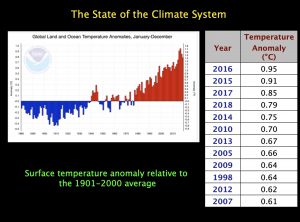 |
4. 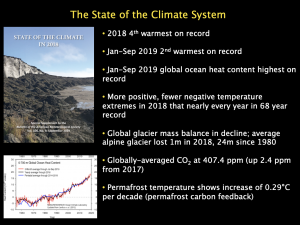 |
5. 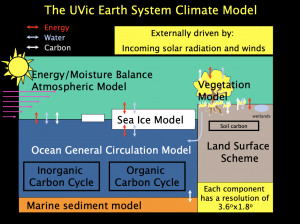 |
6. 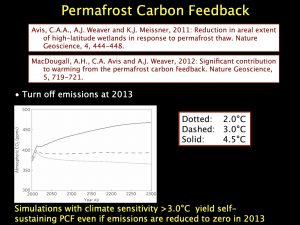 |
7. 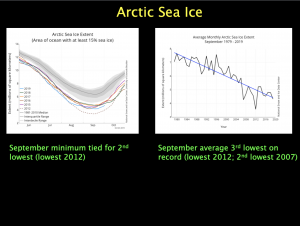 |
8. 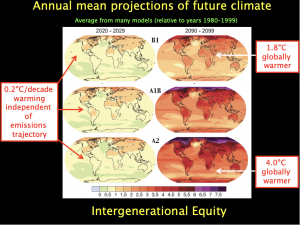 |
9. 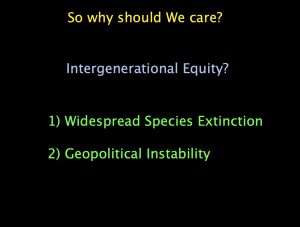 |
10. 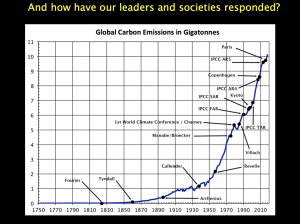 |
11. 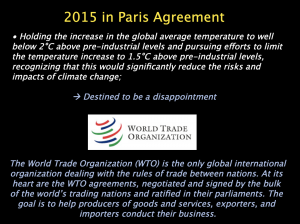 |
12. 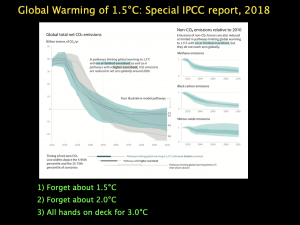 |
13. 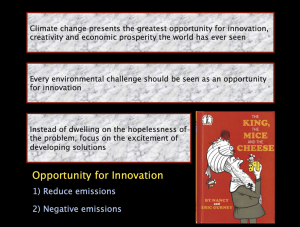 |
14.  |
15. 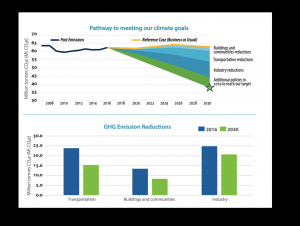 |
16. 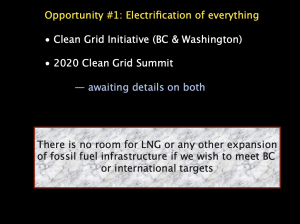 |
17. 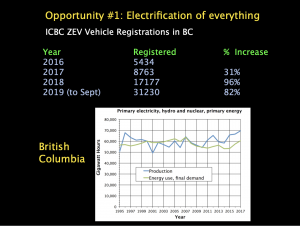 |
18. 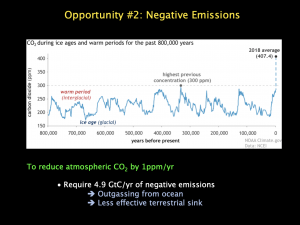 |
19. 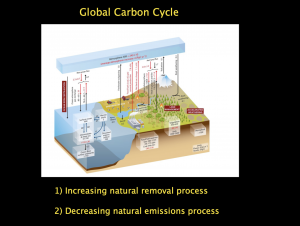 |
20. 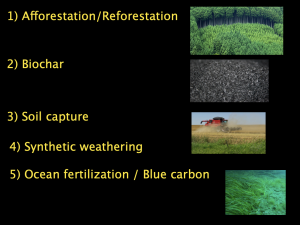 |
21. 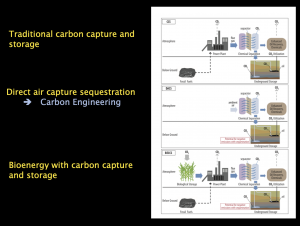 |
22. 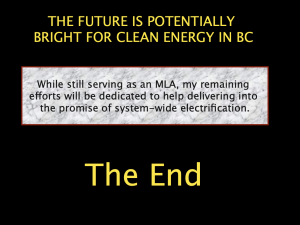 |
Bill 38: Climate Change Accountability Amendment Act, 2019
In the legislature today, the Minister of Environment and Climate Change Strategy tabled Bill 38: Climate Change Accountability Amendment Act, 2019. As noted in the government’s press release, “better accountability, transparency and more detailed targets for climate action will be mandated under a new Climate Change Accountability Act.”
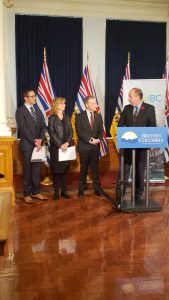 This is an important piece of legislation that the Ministry and my office worked on collaboratively over the last year.
This is an important piece of legislation that the Ministry and my office worked on collaboratively over the last year.
While British Columbia already has legislated greenhouse gas reduction targets, as well as a requirement to collect data for tracking emissions, our targets are set ten years apart and data is published on a two-year delay. Combine that with a four-year government mandate and you create a situation where political parties spend the first two years blaming their predecessors for bad results and the next two years saying they are just getting started while making promises they can only fulfill if you vote them back in. Then, before you know it, the ten year target is within sight, but by that time it is too late to substantively change you emissions trajectory.
As a climate scientist, I know that transparent, accurate, timely, and publicly accessible data is crucial to achieving our climate commitments. Trust us is not good climate policy. The amendments included in this act add real credibility to our province’s efforts.
The transparency and accountability mechanisms embedded within this bill set an evidence-based foundation from which future climate change risk, adaptation and mitigation policy can be built.
Below I reproduce my speaking notes from the joint press conference Minister Heyman and I held. I also reproduce the press release that our office issued once the bill was introduced
Speaking Notes
The Climate Change Accountability Amendment Act tabled today demonstrates minority governments can move beyond political rhetoric and collaborate on ambitious climate legislation.
This act introduces transparency and accountability mechanisms that, if passed, will last well beyond this current government and set an evidence-based foundation from which all future climate policy can be built.
As a climate scientist, I know that transparent, accurate, timely, and publicly accessible data is crucial to achieving our climate commitments.
Trust us is not good climate policy. The amendments included in this act add real credibility to our province’s efforts.
British Columbia already has legislated greenhouse gas reduction targets, as well as a requirement to collect data for tracking emissions, but targets are set ten years apart and data is published on a two-year delay.
Combine that with a four-year government mandate and you create a situation where party leaders spend the first two years blaming their predecessors for bad results and the next two years saying they are just getting started while making promises they can only fulfill if you vote them back in. Then, before you know it, the ten year target is within sight, but by that time it is too late to substantively change you emissions trajectory.
I have seen so many promising policies fail because of this pattern of inaction, so fixing it was a top priority.
Bringing in diverse perspectives to tackle policy is the strength of this minority government. The Ministry of Environment and Climate Change Strategy has been exceptional in reaching out to our caucus over these many months. It has been a remarkable experience to collaborate with Minister Heyman and his team on the development of this critical piece of legislation.
Media Release
Legislation introduced to Ensure Climate Action Accountability
For immediate release
Oct. 30, 2019
VICTORIA, B.C. – The Climate Change Accountability Amendment Act tabled today demonstrates minority governments can move beyond political rhetoric and collaborate on ambitious climate legislation. This act introduces transparency and accountability mechanisms that, if passed, will last well beyond this current government and set an evidence-based foundation from which all future climate policy can be built.
“Campaign trail promises to address climate change are meaningless without concrete policy action to bring those promises to fruition,” said B.C. Green Party leader Dr. Andrew Weaver, MLA from Oak Bay- Gordon Head. “As a climate scientist, I know that transparent, accurate, timely, and publicly accessible data is crucial to achieving our climate commitments. ‘Trust us’ is not good climate policy. The amendments included in this act add real credibility to our province’s efforts.”
British Columbia already has legislated greenhouse gas reduction targets, as well as a requirement to collect data for tracking emissions, but targets are set ten years apart and data is published on a two-year delay.
“Combine that with a four-year government mandate and you create a situation where party leaders spend the first two years blaming their predecessors for bad results and the next two years saying they are just getting started while making promises they can only fulfill if you vote them back in,” said MLA Weaver. “I have seen so many promising policies fail because of this pattern of inaction, so fixing it was a top priority.”
This legislation will cut through those excuses by shortening the time scale and increasing transparency: Interim targets allow for evaluations and course corrections before it is too late; Annual emissions reporting standards and sectoral targets assist both industry and the public in identifying where emissions originate, which policies are working, which are not, and how everything aligns with our province’s fiscal forecast; A legislated and independent advisory committee will provide another check on government and ensure a diverse range of perspectives is always included.
“Bringing in diverse perspectives to tackle policy is the strength of this minority government,” Weaver said. “The Ministry of Environment and Climate Change Strategy has been exceptional in reaching out to our caucus over these many months. It has been a remarkable experience to collaborate with Minister Heyman and his team on the development of this critical piece of legislation.”
The Climate Change Accountability Amendment Act is a legislated component of CleanBC, which sets a pathway to a stronger, more sustainable future by reducing carbon pollution and creating economic opportunities across the province. CleanBC was collaboratively developed by the government and the B.C. Green Caucus and supports the commitment in the Confidence and Supply Agreement to implement climate action to meet B.C.’s emission targets.
-30-
Media contact
Macon L.C. McGinley, Press Secretary
B.C. Green Caucus
+1 250-882-6187 | macon.mcginley@leg.bc.ca




